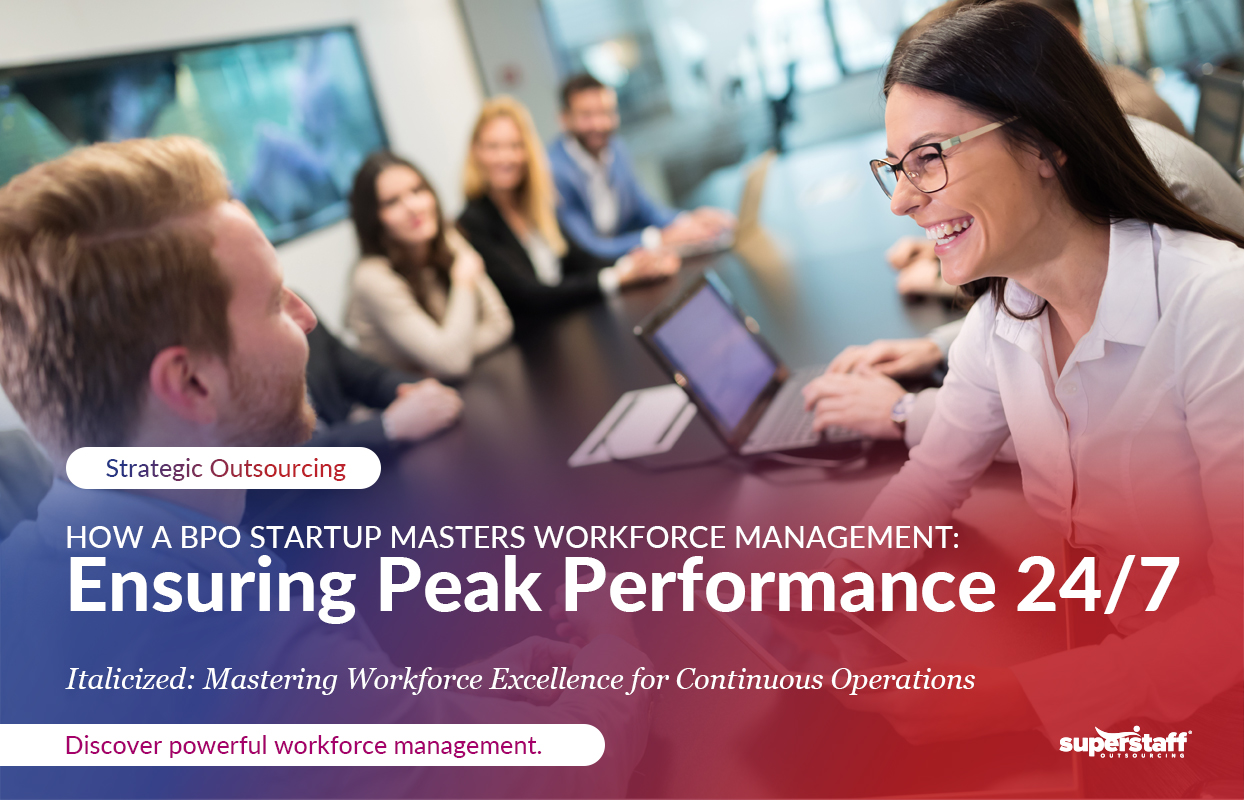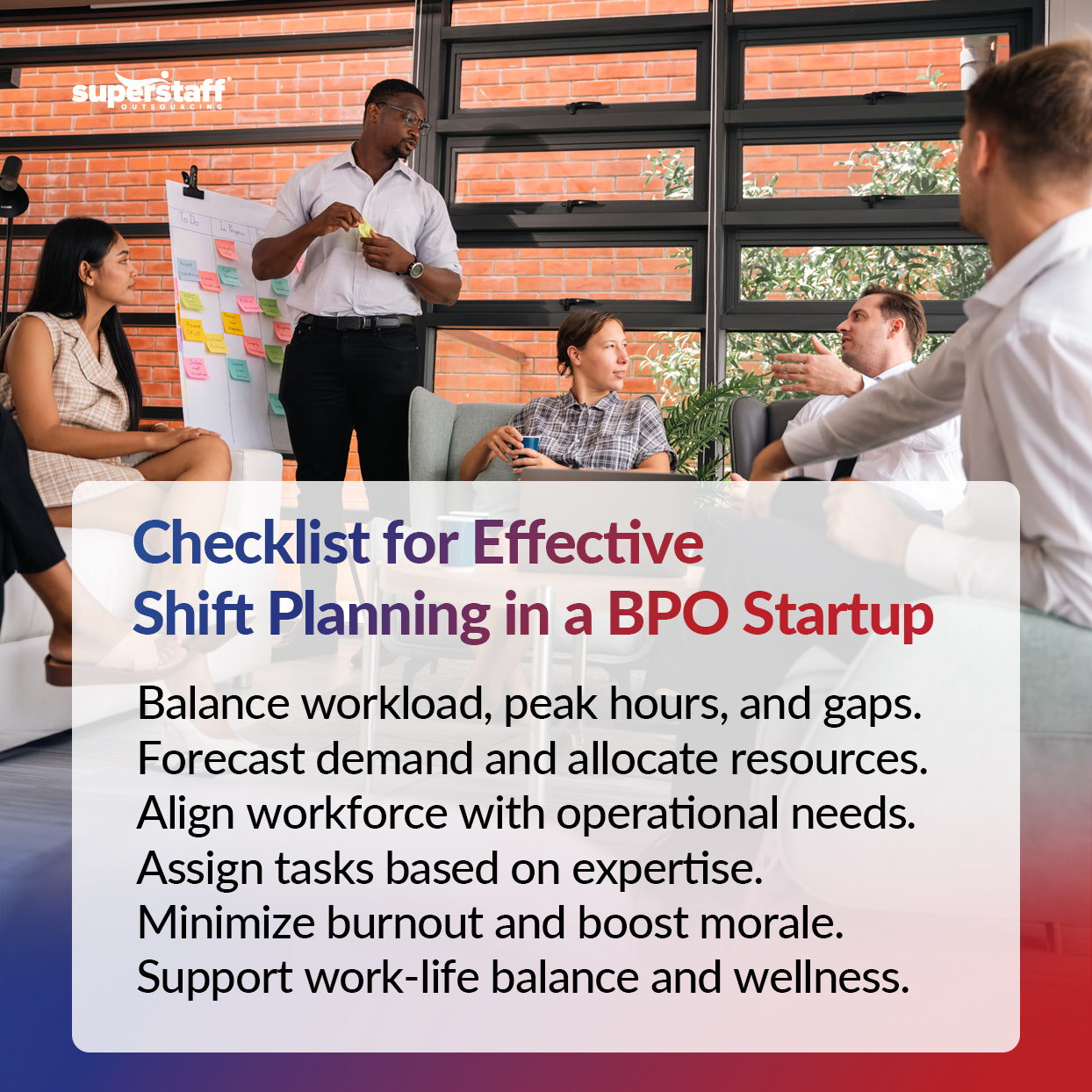
The BPO industry thrives on agility and scalability, especially as businesses increasingly demand seamless, round-the-clock services. For BPO startups, operating 24/7 is no longer a competitive edge. It’s a fundamental expectation in meeting global client needs.
Yet, delivering uninterrupted service across time zones is anything but straightforward. Success requires more than innovative shift schedules. It calls for comprehensive workforce strategies that address fluctuating demands, prioritize employee support, and consistently meet client expectations without compromise.
This article explores the strategies that drive continuous, high-performing operations. From navigating demand fluctuations to building reliable systems, discover how BPO startups in the Philippines can maintain peak performance and uphold their reputation for dependability at every hour of the day.
Effective Scheduling and Shift Planning for a BPO Startup

The success of night-and-day operations in the BPO industry begins with strategic shift scheduling.
Proper scheduling ensures that employees are available during peak demand and that service quality remains uncompromised. It also bridges operational gaps, balances workload distribution, and enhances employee satisfaction, which is critical for maintaining a high-performing team.
Utilizing Predictive Scheduling Tools
Predictive scheduling tools offer BPO companies a data-driven approach to forecasting customer demand patterns. These tools analyze peak and off-peak periods, enabling businesses to allocate resources effectively. By aligning workforce deployment with demand levels, BPO startups can prevent common issues like overstaffing and understaffing while optimizing labor costs. Predictive scheduling also allows leaders to address employee concerns, such as job satisfaction and work-life balance, which are crucial for sustaining a motivated workforce.
Assigning Shifts Based on Employee Strengths
Assigning shifts with precision can transform operations. Much like chess, where each piece plays a unique role, employees bring distinct strengths to the table.
Understanding individual capabilities allows managers to assign tasks and shifts that maximize employee efficiency and expertise. For instance, some employees may excel in high-pressure situations, while others thrive in roles requiring meticulous attention to detail. Strategically deploying these strengths ensures that service delivery remains seamless, regardless of demand fluctuations.
Rotating Shifts to Prevent Burnout
While efficiency is key, employee well-being must remain a priority. The demanding nature of BPO work, especially during nontraditional hours, can impact physical and mental health. Rotating shifts allows employees to rest, recover, and recharge, reducing fatigue and minimizing burnout risks.
A recent study showed the value of this approach: companies that actively support employee well-being report 25% fewer stress-related symptoms and a 58% drop in burnout frequency. This culture of care enhances employee satisfaction and translates to better performance and client satisfaction.
With a robust shift-scheduling framework, the next step is implementing real-time monitoring systems to enhance operational efficiency.
Real-time Monitoring and Adjustments
The BPO industry operates in constant motion, with demands evolving rapidly. To keep pace with shifting expectations and maintain a competitive edge, you need real-time monitoring and agile adjustments. These are essential for a BPO startup’s survival and growth.
Performance Dashboards for Immediate Insights
Performance dashboards are the backbone of efficient team management. These tools ensure alignment with overarching business goals by providing a comprehensive view of individual and team performance. Every employee plays a vital role in the company’s success, and dashboards illuminate their contributions, allowing leaders to identify strengths, address weaknesses, and make rapid adjustments to maintain peak efficiency. With these insights, BPO startups can pivot quickly, keeping operations smooth and outcomes predictable.
Rapid Staffing Adjustments To Balance Workloads
Balancing workloads is critical in preventing employee burnout and maintaining morale. Rapid staffing adjustments enable fair task distribution, fostering an environment of support and flexibility.
More than half (57%) of employees are more comfortable with work changes when they have flexible setups, highlighting the need for BPO startups to create a culture of fairness that can boost productivity while retaining top talent.
Automated Alerts for Quick Decision-Making
In an industry where speed is everything, automated alerts are indispensable. These customized notifications provide instant updates on urgent issues, allowing leaders to prioritize and act decisively. Relying on manual reviews of notifications wastes time and hampers productivity. Automated systems empower BPO startups to manage more alerts effectively, ensuring that no critical issue slips through the cracks.
Real-time monitoring is the foundation of responsive decision-making, but it’s only part of the equation. Strategic staffing plans and proactive measures are equally vital for ensuring a BPO startup in the Philippines remains competitive in a fast-paced, ever-changing landscape.
Data-Driven Forecasting for a BPO Startup in the Philippines
Data-driven forecasting empowers BPO companies to optimize staffing strategies by precisely anticipating demand. This approach ensures operations remain efficient, responsive, and prepared for fluctuations—transforming reactive processes into proactive, strategic decision-making.
AI-Powered Demand Prediction
Advanced AI tools allow BPOs to monitor data trends and accurately predict future peak seasons. It is similar to how streaming platforms recommend shows based on viewing habits. These algorithms analyze patterns, anticipate user preferences, and provide tailored suggestions. For BPOs, AI works similarly by identifying historical patterns in demand spikes, enabling companies to prepare well ahead of time with targeted staffing plans.
BPO companies leverage AI tools to oversee data and foresee future peak seasons and high demands. Picture this like an algorithm in a streaming platform or service: those platforms use algorithms to predict and recommend videos or shows based on what you’ve previously watched. They analyze patterns in your watching habits and showcase what the algorithm analyzes as best for you. The same can be applied to AI-powered tools used by BPO companies. By analyzing peak seasons and demands in the past, they use that data to predict demand spikes in the future and plan accordingly.
Historical Data Analysis for Accurate Staffing
Historical data serves as the foundation for informed decision-making. By examining past demand cycles, BPOs can align their staffing strategies with anticipated future spikes. For instance, planning staffing schedules during anticipated high-demand periods ensures peak performance while avoiding the chaos of last-minute adjustments. Early preparation not only supports operational success but also minimizes risks associated with reactive staffing.
Reduced Risks of Overstaffing and Understaffing
Data-driven forecasting mitigates the challenges of overstaffing and understaffing, two of the most common pitfalls in workforce management. By aligning employee numbers with predicted demand, BPOs maintain efficiency, preserve resources, and ensure seamless service delivery. Properly timed staffing adjustments keep operations cost-effective and reliable, regardless of season.
However, tools alone aren’t enough to guarantee success. A critical factor lies in the expertise and adaptability of the workforce itself. The ongoing development of employee skills through robust training programs ultimately drives long-term excellence in BPO operations.
Engaging Employee Training and Development
Employee training and skill development form the cornerstone of success in the BPO industry. A well-trained workforce is essential for delivering exceptional service across day, night, and even holiday shifts. This foundation is built on structured training programs, specialized upskilling initiatives, and continuous performance assessments. Here’s a closer look at how BPO companies prepare their employees to excel in every scenario.
Training Programs on Industry-Specific Skills
Effective training equips BPO employees with the knowledge to meet company objectives and embody organizational values. However, industry-specific training goes a step further by focusing on the nuances of the sectors they serve. Consider your experience contacting customer service for a technical issue. The representative’s ability to navigate complex product details and determine when to escalate your concern stems from specialized training designed to meet industry demands. This ensures every interaction is efficient, professional, and aligned with client expectations.
Upskilling for Specialized Support Roles
Beyond foundational training, BPOs invest in upskilling employees for specialized support roles. These representatives focus on specific service areas, ensuring operational efficiency and helping customers navigate the right channels for their concerns. For example, technical support agents handle inquiries about complex tech products, while other teams specialize in healthcare, financial services, or e-commerce. This segmentation not only streamlines operations but also enhances the customer experience by providing tailored solutions.
Read more: How Specialized Call Center Agent Boosts Customer Experience
Regular Assessment for Continuous Improvement
Training in the BPO industry doesn’t stop after the onboarding phase. Employees undergo regular assessments to refine their skills and ensure their growth aligns with business objectives. Performance metrics, such as KPIs and documented feedback sessions, are critical for identifying areas for improvement and driving consistent excellence. This commitment to ongoing development ensures employees stay ahead of evolving industry demands, enabling BPOs to maintain their reputation for reliability and high performance.
While training and development are pivotal, employee well-being is equally critical. In the next section, we explore how BPO startups balance rigorous operational demands with practices that promote workforce health and satisfaction.
Emphasizing Employee Well-being
The demands of round-the-clock operations can be physically, mentally, and socially exhausting for employees. While training equips them for the technical aspects of the job, prioritizing their well-being is equally critical. Recognizing this, leading BPO companies implement comprehensive health and wellness policies that ensure employees feel supported and valued.
Flexible Work Options for Work-life Balance
Recent McKinsey studies revealed that office attendance has dropped by 30% compared to pre-pandemic levels, highlighting the evolving expectations of today’s workforce. Employees dedicate significant energy to delivering exceptional service, but they also have limits. Flexible work arrangements allow employees to maintain a sustainable work-life balance, helping them recharge and return to work refreshed. For BPO companies, offering this flexibility is not just a perk—it’s a strategic move to boost productivity and morale.
Wellness Programs Focused on Mental Health
A positive work environment is essential for fostering a strong, engaged team. Yet, studies show that 73% of employees report that workplace stress strains their relationships with peers, a challenge especially prevalent in people-focused industries like BPO. To address this, many companies have adopted wellness programs centered on mental health. These initiatives promote a supportive culture, reduce burnout risks, and empower employees to perform at their best.
Regular Breaks to Prevent Burnout
Alongside structured wellness programs, one of the simplest yet most impactful ways to prevent burnout is by encouraging regular breaks. According to a different study by McKinsey, 38% of working mothers say they would reduce shifts or leave their jobs if workplace flexibility was unavailable. Employees juggle professional demands with personal responsibilities, and offering consistent opportunities to rest and recharge ensures higher retention and minimizes fatigue.
With employee well-being at the core, the next critical step for BPO companies is recognizing and rewarding hard work through meaningful incentives. Acknowledging their contributions not only motivates employees but also reinforces a culture of appreciation and loyalty. By placing employee well-being at the heart of operational strategies, BPO companies can build resilient teams capable of thriving in demanding environments.
Incentivizing High Performance
Recognizing and rewarding employee achievements is a proven strategy to boost productivity and inspire excellence. For BPO companies tasked with delivering 24/7 services, well-designed incentive programs not only motivate employees but also enhance operational efficiency and performance.
Performance Based-Bonuses
Think of performance-based bonuses as an additional reward for accomplishing a specific quest in a videogame beyond the expectation of the quest giver. Instead of being rewarded the agreed-upon 200 gold for saving one cat, you’re rewarded 500 gold for saving five cats. Performance-based bonuses work similarly, where employees are rewarded above their usual salary for going above and beyond in their duties and performance. The processing of performance-based bonuses varies from company to company but they usually use the employee’s excelling performance as a basis.
Employee of the Month Programs
Being recognized for your performance is a very fulfilling experience. Studies have shown that 73% of employees are less likely to feel overwhelmed or burnt out when recognized for their efforts in their duties. Understanding this, BPO companies formalize recognition through the employee of the month programs as another reward for excelling in their performance and services, highlighting their achievements.
Personalized Incentives Aligned with Goals
Incentivizing employees isn’t necessarily limited to only performance bonuses and programs. Tailoring rewards to employees’ personal preferences can create a more meaningful impact. Beyond bonuses or promotions, perks like restaurant vouchers, coffee shop gift cards, or team outings can boost morale and foster camaraderie. Personalized incentives, especially after busy seasons, help employees feel valued while encouraging team cohesion.
As the BPO industry continues to demand scalable operations, incentivizing high performance remains the bedrock of effective workforce management, ensuring teams are motivated, productive, and ready to adapt to evolving needs.
Flexible and Scalable Solutions
Flexibility and scalability are the secrets to a BPO company’s success. BPOs thrive by adapting to fluctuating demands, ensuring their operations run seamlessly, regardless of the challenges. Achieving this balance hinges on effective workforce management, as even slight deviations from demand forecasts can disrupt performance. Here’s what they can do for your business:

Blending Full-time and Part-time Teams
A well-orchestrated blend of full-time and part-time staff is critical to BPO flexibility. Full-time employees provide stability, maintaining operations during periods of steady demand. Meanwhile, part-time teams are strategically deployed to bolster capacity during peak seasons or sudden demand surges. This agile staffing model ensures that internal teams remain productive while avoiding the pitfalls of overstaffing during quieter periods.
Leveraging Remote Work for Global Support
Global demands require global solutions, and BPOs have increasingly turned to remote work to meet this challenge. Roles like multilingual support exemplify how remote setups enable seamless service delivery across time zones and regions. By leveraging remote work, BPOs not only enhance operational efficiency but also empower their teams to connect with clients in their preferred languages, no matter where they are based.
Outsourcing Partners for Added Scalability
Outsourcing partnerships further enhance BPO scalability by integrating external teams into operations. These partnerships create an adaptable workforce that seamlessly scales to meet round-the-clock demands. By combining the strengths of internal and external teams, BPOs achieve a level of operational capacity that drives exceptional service delivery.
Scalability and flexible workforces prevent understaffing and overstaffing, which BPOs have come to understand and fully utilize.
Strategic Workforce Management: The Secret Behind a High-Performing BPO Startup
In the competitive BPO industry, success hinges on one critical factor: workforce management. Leading BPO companies don’t just operate 24/7. They thrive in this demanding environment by deploying strategic scheduling, real-time performance monitoring, and data-driven decision-making. These organizations invest heavily in training, wellness initiatives, and performance incentives to empower their teams, ensuring efficiency and excellence at every hour of the day.
But what sets these companies apart? It’s their ability to balance operational precision with employee well-being, creating a workforce that is not only skilled but also motivated to deliver exceptional results.
SuperStaff exemplifies this approach. With a dynamic team of highly trained professionals, innovative processes, and unwavering commitment to excellence, SuperStaff offers seamless, around-the-clock BPO solutions tailored to meet the most complex business needs. Curious to see this operational brilliance in action? Let’s explore what makes SuperStaff a standout partner for success.






